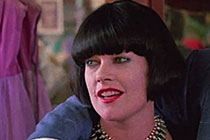|
|
|
|
Something Wild
|
 |
|
Something Wild is among the liveliest
and most enjoyable movies of the 1980s. One could easily produce a schematic
account of it – straight-laced guy Charlie (Jeff Daniels) liberated by wild gal
Lulu (Melanie Griffiths), initiation into free-wheeling road-movie bohemia,
looming threat of the past and of the mirror-rival (a figure we find, variously,
in many mid ‘80s films including Black Widow [1987]),
romantic comedy resolution – but its greatness lies in the way it scatters all the
schemas.
I haven’t seen a film in ages where so much stuff is
leaking out the sides, or where the so-called plot is so shamelessly a
successive series of what-ifs made
real (eg., what if Charlie and Lulu visit her mother and pretend they’re
married?). Ray Liotta as the mirror rival (Lulu’s husband Ray) introduces mid-way
into the film a truly remarkable rupture in tone (a brave thing for any movie
to take on) and a whole series of inflections and distortions of every bit of
sense previously set up: it seems OK for Lulu to mock Charlie’s middle class-ness,
but when Ray takes up the chant, more viciously and with trouble in mind,
bourgeois security doesn’t seem, after all, such a bad defence against resentful,
freaked-out sociopathy.
But then, everything in Something Wild has another side, a sentimental and/or tough edge
that is revealed in the picaresque course of proceedings. The city schmuck has
been hiding for a few crucial facts and playing his own games; the “wild thing”
can adapt her own performance (sincerely as well as playfully) to suit her hometown,
and has her own base-line moral code, however contradictory; the bad guy is
mesmerisingly charming and smart. The film just keeps on re-inventing itself
before our eyes – recasting its characters, its tone and its genre.
And there is truly the vision of a whole new world
(richly inscribed, described and felt) here: a world of
colours, rhythms, architectural angles, songs, strategies of behaving in the moment,
games, apparitions. My favourite bit – perfect mixture of ease and hysteria
that keeps the entire film afloat – happens when Charlie, eyes fixed on the
plot-move outside the window, begins changing his pants in a petrol station
supermarket; the black shop attendant, humouring these antics as best he can,
ventures: “Attempt to be cool!”
Something Wild keeps deliberately
blowing its cool – yet it finds, in the movements of its hot-footed dance, a
grace rarely seen or heard before on screen. It is this grace, magically won
beyond the fixed constraints of identity or plot, that finally allows us to
break free of the vicious circles of mirror-rivalry.
MORE Demme: The Agronomist, The Manchurian Candidate, The Truth About Charlie, Ricki and the Flash, Beloved © Adrian Martin March 1987 |
![]()